If you’re running a clinic today, chances are you’ve invested time (and money) into things like websites, SEO, and maybe even Google Ads.
But the way people find care is changing—fast.
More patients are now turning to AI-powered tools like ChatGPT, Google’s AI Overviews, Siri, and Alexa to get answers to health questions and find nearby providers.
That’s where Healthcare GEO comes in.
What Is Healthcare GEO (Generative Engine Optimization)?
Healthcare GEO stands for Generative Engine Optimization for clinics and Healthcare providers.
It’s not about showing up in search results. It’s about being named and recommended in answers generated by AI.
Think of it this way:
- Healthcare SEO helps your clinic show up in a list of websites.
- Healthcare GEO helps your clinic get chosen by an AI when it gives one single answer.
That’s a big difference—and a big opportunity.
Because if an AI assistant tells someone,
“Try Maplewood Family Clinic. They specialize in pediatric care and are highly rated,”
that person may never need to click anything else.
Why It Matters for Clinics
Let’s say someone asks their phone:
“What’s the best urgent care near me that accepts walk-ins?”
They may get one or two clinic names back. No links. No ads. Just a direct answer.
That response is generated based on what the AI has read and remembered about your clinic.
And that means:
- If your clinic info online is outdated, inconsistent, or vague → you might get left out.
- If you’re clearly described, mentioned in trusted places, and well-reviewed → you’re more likely to be included.
You won’t know when it happens. You won’t see it in your analytics.
But you’ll either be part of that answer—or you won’t.
How AI Picks Which Clinics to Recommend
AI systems don’t think like people. They don’t search or click.
They “read” the internet and make decisions based on:
- Mentions of your clinic across the web
- Consistency of your clinic’s name, location, and services
- Reputation signals (like reviews and media mentions)
- Technical clarity (like proper website structure and clean formatting)
- Trust in the sites that mention you
If your clinic has clear, repeated, and trustworthy signals—everywhere—AI systems are more likely to remember and recommend you.
If your information is scattered or unclear, you may be ignored.
Not rejected. Just forgotten.
The New Gatekeepers: AIs That Recommend (or Ignore) Your Clinic
Patients are using more than just Google these days to find care.
AI tools like ChatGPT, Gemini, Claude, Perplexity, and Siri are quickly becoming the first place people ask health-related questions—skipping traditional websites altogether.
Here’s a quick overview of the main platforms shaping how patients discover clinics in 2025. We are going to ask the same query to all of them, let’s see what happens.
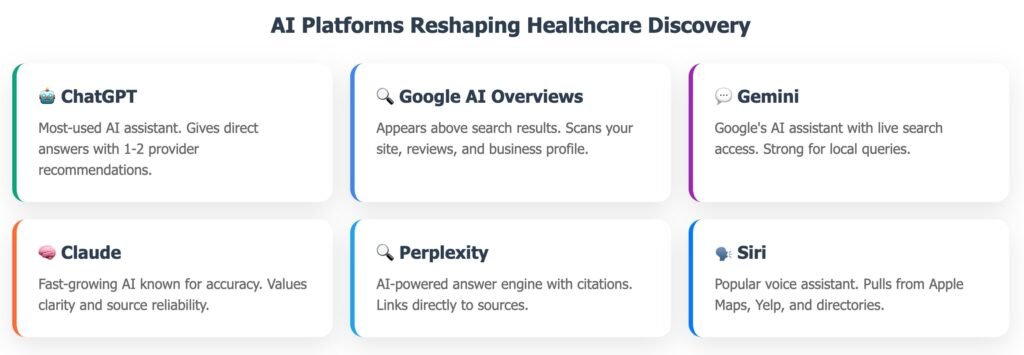
🤖 ChatGPT (OpenAI)
What it does: ChatGPT is one of the most-used AI tools in the world. People use it like a smart search assistant—asking about symptoms, treatments, and nearby care.
Example: “Could you recommend a reliable and not-so-expensive ultrasound clinic in London?”
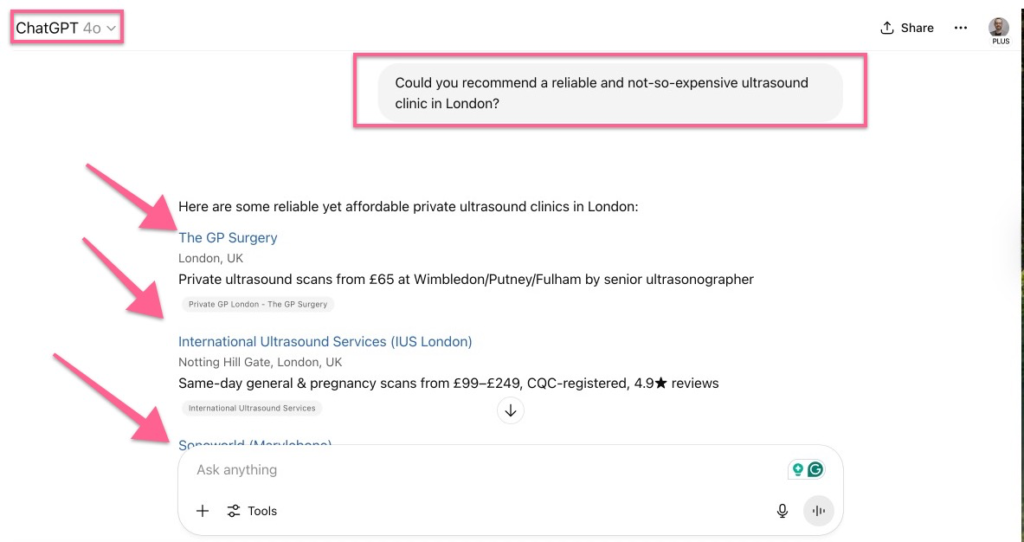
How it works: With browsing enabled, ChatGPT reads websites, business listings, and trusted sources. It gives direct answers—often naming 1–2 providers.
Why it matters: If your clinic is clearly described online and consistently mentioned across platforms, you may be the name that shows up.
🔍 Google’s AI Overviews (formerly SGE)
What it does: AI Overviews are now baked into Google Search. They appear above regular results for many health-related queries.
Example: “Could you recommend a reliable and not-so-expensive ultrasound clinic in Ireland?” might return an AI summary with a clinic name before any organic or ad links.
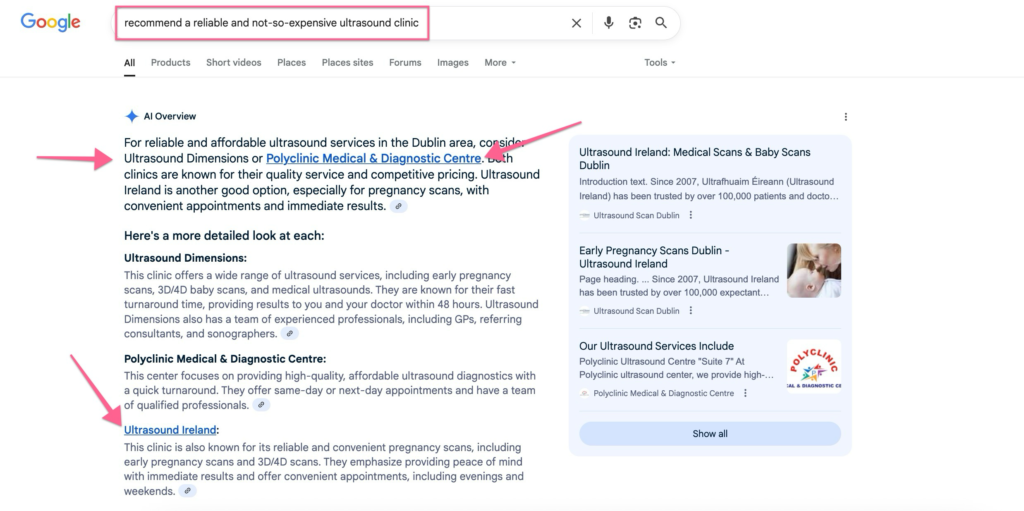
How it works: Google’s AI scans your site, Google Business Profile, reviews, and trusted mentions to decide what to show.
Why it matters: Being part of these answers requires strong SEO fundamentals plus GEO clarity—like schema markup, consistent services, and solid reputation signals.
💬 Gemini (Google)
What it does: Gemini is Google’s AI assistant, now integrated into Android devices, the Google app, and Chrome.
How it behaves: Like ChatGPT, but with live access to Google Search results—making it strong at real-time, local queries.
Example: “Could you recommend a reliable and not-so-expensive ultrasound clinic in London?”
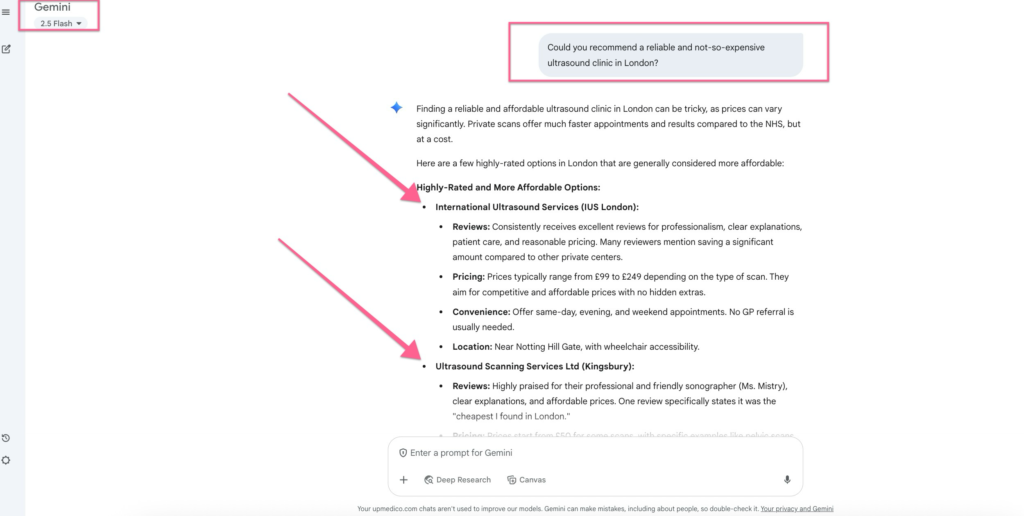
Why it matters: If your clinic has a well-optimized Google Business Profile and clear site structure, Gemini can surface it in conversational responses.
🧠 Claude (Anthropic)
What it does: Claude is a fast-growing AI assistant known for its accuracy and safety. It’s especially popular in professional settings and enterprise tools.
How it works: Like ChatGPT, Claude can browse the web and summarize trusted content. It tends to value clarity and source reliability.
Example: “Could you recommend a reliable and not-so-expensive ultrasound clinic in London?”
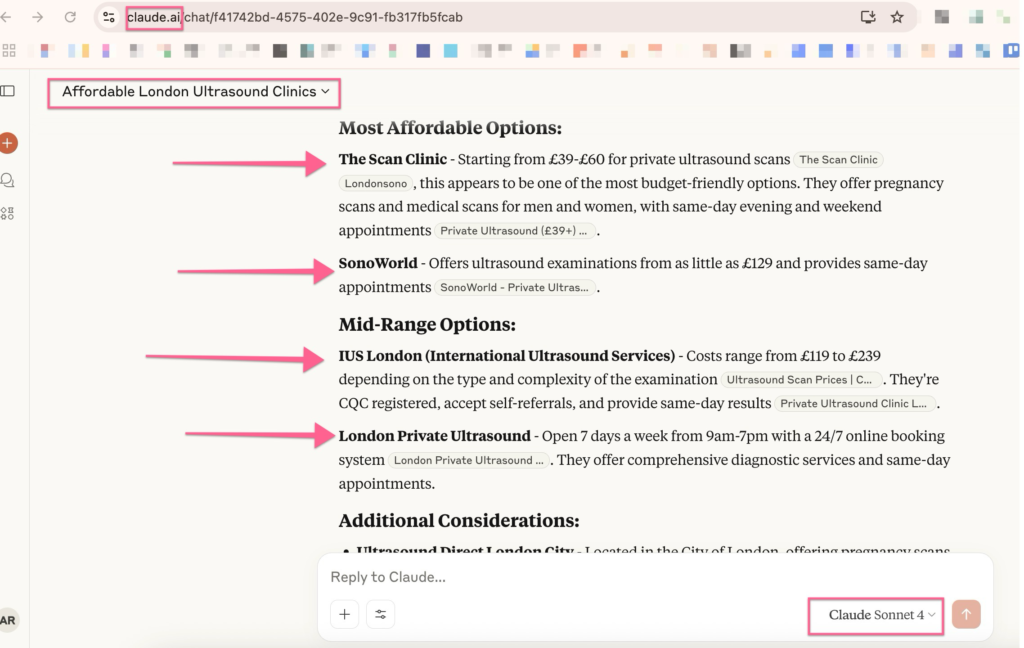
Why it matters: As usage grows, being mentioned in clearly written, well-structured content becomes more important for visibility in Claude’s answers.
🔍 Perplexity
What it does: Perplexity is an AI-powered answer engine that combines direct answers with live sources and citations—like an AI-powered Wikipedia + Google hybrid.
How it works: It reads the web in real time and shows where its answers come from, often linking to actual clinics and directories.
Example: “Could you recommend a reliable and not-so-expensive ultrasound clinic in London?”
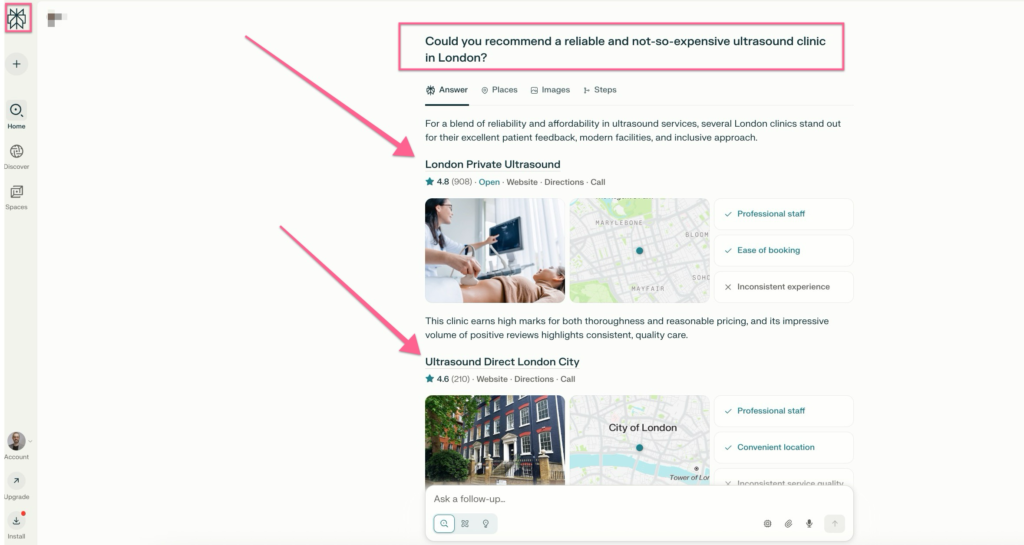
Why it matters: This is one of the most transparent tools—if your site and listings are well-structured, Perplexity may cite you directly in its answers.
🗣️ Siri (Apple)
What it does: Siri remains a popular voice assistant—especially among iPhone users—for quick health questions and local searches.
Example: “Could you recommend a reliable and not-so-expensive ultrasound clinic in London?”
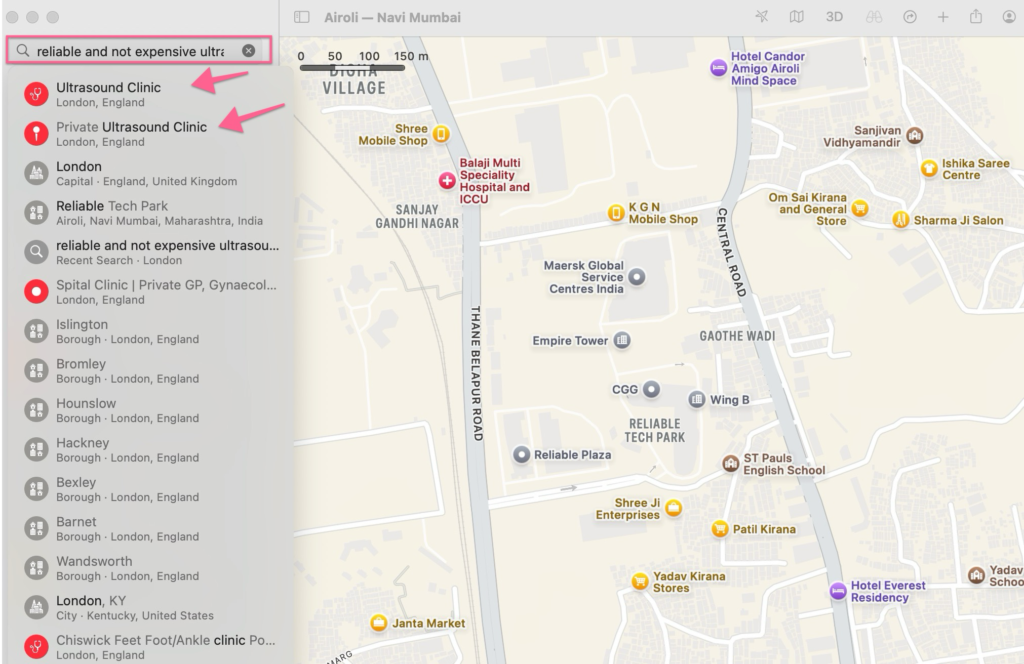
How it works: Siri pulls data from Apple Maps, Yelp, and healthcare directories—not your website directly.
Why it matters: If your listings are inconsistent or incomplete on these platforms, Siri may skip right past you—even if you’re the top provider nearby.
GEO for Healthcare: 3 Things to Get Right
You don’t need to master AI to make progress here. Start with three simple principles:
1. Say the Same Thing Everywhere
Make sure your clinic’s name, address, services, and description are identical across platforms:
- Google Business Profile
- Yelp
- Your own website
- Local directories
Avoid things like using “Maplewood Pediatric Urgent Care” in one place and “Maplewood Kids Clinic” in another. That confuses both people and machines.
2. Use Clear Language That AI Can Understand
On your website and listings:
- List your services plainly: “Urgent care,” “Pediatric primary care,” “Sports physicals,” etc.
- Write short, direct sentences.
- Use consistent wording across pages (don’t call it “family health” in one spot and “primary care” in another).
AI tools look for patterns. Help them recognize what you do—without fancy language.
3. Build Your Reputation Across the Web
AI doesn’t just read your website. It pulls from:
- Reviews
- Local news articles
- Blog mentions
- Community events
- Transcripts from podcasts or videos
You want to be mentioned—and described consistently—in as many trusted places as possible.
Encourage your happy patients to leave reviews (and mention specific services).
If your clinic sponsors a local event, ask if they’ll list your name on their site.
If a local health writer is doing a story, offer a quote.
These all become “evidence” for the AI to use.
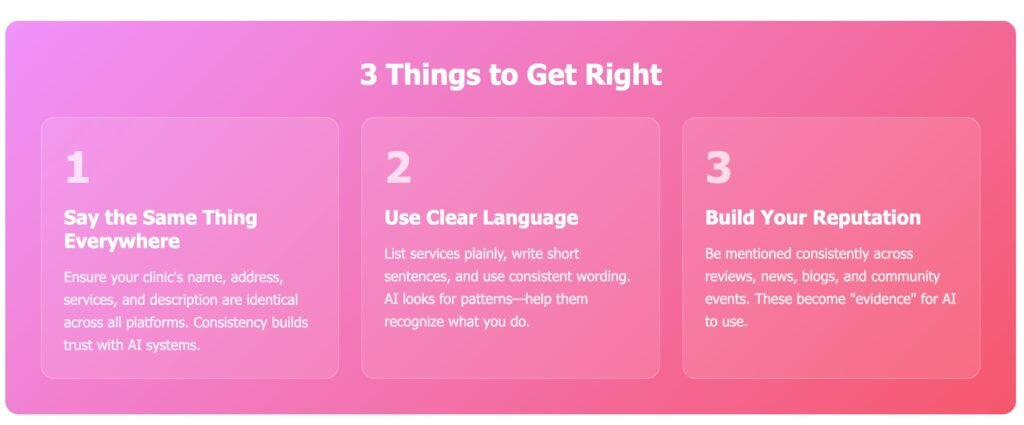
How to Strengthen GEO with Technical Tools
If someone manages your website, they can help with the technical side of GEO:
Want Your Clinic Website to Rank Higher—and Be Understood by AI?
Here are 5 smart (and simple) upgrades you can make today:
✅ 1. Schema Markup
Add structured data to your site so search engines and AI tools know exactly what your clinic does.
Use schemas like:
MedicalClinicfor general clinicsPhysicianfor individual doctorsUrgentCareClinicfor walk-in or rapid care services
👉 Helps your pages appear in rich search results and be picked up by AI-powered tools like Google’s SGE or ChatGPT.
✅ 2. Site Structure
Make sure every service you offer has its own page.
Examples:
/flu-shots/childrens-health/ultrasound-services
👉 Clear structure improves usability and allows AI to correctly categorize your offerings.
✅ 3. FAQ Pages = SEO + AI Gold
FAQ sections are not just for patients—they’re ideal for AI to scan and summarize.
Use clear formatting and, if possible, add FAQ Schema.
Include common questions like:
- “What does a scan cost?”
- “Do you accept walk-ins?”
- “Is parking available?”
✅ 4. Consistent Local Info (NAP)
Your Name, Address, and Phone Number (NAP) should be exactly the same on:
- Your website
- Google Business Profile
- Online directories
👉 This builds local SEO strength and helps AI confidently associate your clinic with a specific location.
✅ 5. Include an llm.text File
Add a simple, plain-text file called llms.text to your website’s root.
Inside, summarize your clinic’s key details, services, and contact info in clear language.
Why it matters:
➡️ AI models (like ChatGPT, Google Gemini, etc.) use these files to quickly understand who you are and what you offer.
➡️ It increases your chances of being accurately featured in AI-generated recommendations.
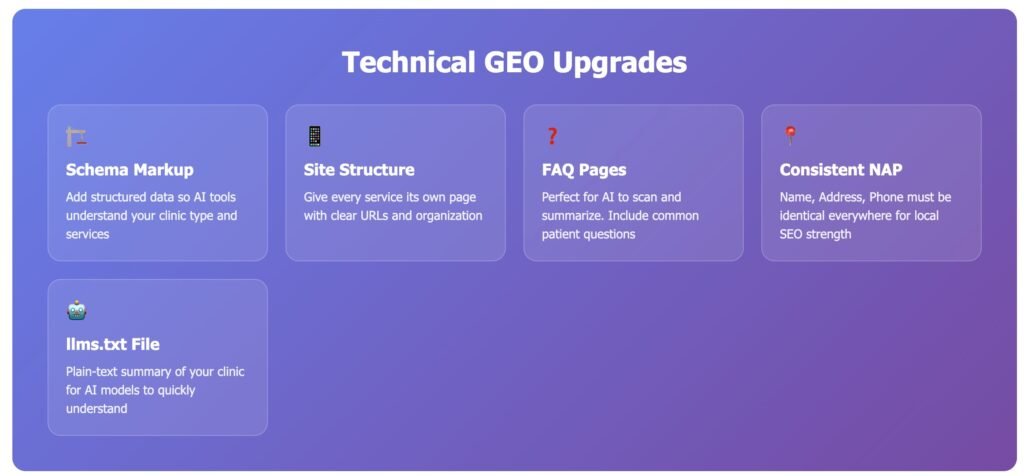
Healthcare GEO vs. Healthcare SEO: What’s the Difference?
| Feature | SEO | GEO |
|---|---|---|
| Goal | Rank higher in search | Be included in AI answers |
| Audience | Human searchers | AI systems |
| Strategy | Keywords, links, traffic | Clarity, consistency, reputation |
| Metrics | Clicks, page views | No clear metrics—more indirect |
Think of SEO as trying to “win” Google.
GEO is about becoming a trusted answer for machines that don’t click—they decide.
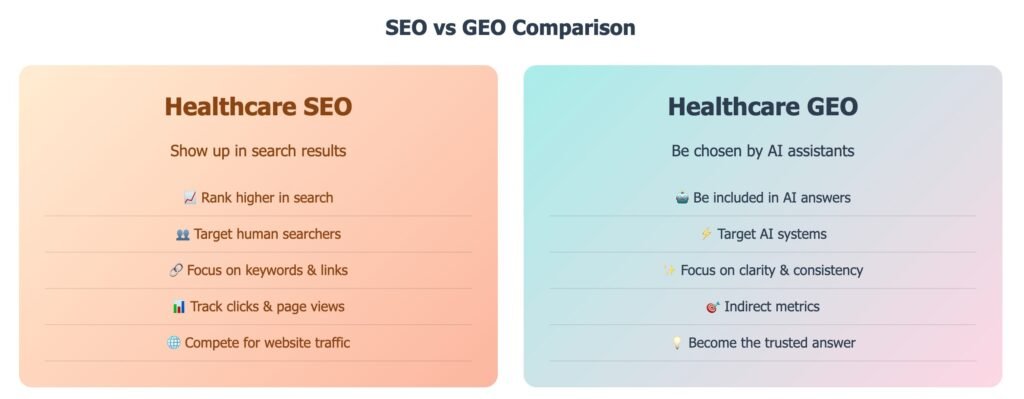
What to Expect Going Forward
You may not see instant results.
GEO doesn’t show up in your reports the way SEO does.
But you’ll start to notice:
- More patients saying “I found you through Google’s AI overview”
- More referrals from places you didn’t directly advertise
- A stronger presence in AI answers—even if you’re not running ads
It’s a long-term strategy. But for clinics looking to stay relevant in the age of AI, it’s not optional.
🔍 Quick FAQ: GEO & Healthcare Clinics
Q: Does GEO replace SEO?
No—but it shifts the focus. SEO still matters for your website. GEO helps your clinic get included in AI-generated answers, which users increasingly trust more than search results.
Q: Can I track GEO performance?
Not directly. AI systems don’t send referral traffic or report impressions. But you can watch for indirect signals like:
- Patients saying they “heard about you” in AI tools
- More branded search volume
- Growing mentions across third-party platforms
Q: What’s the first thing I should fix?
Start with consistency. Make sure your clinic’s name, address, services, and contact info are identical across Google, Healthgrades, WebMD, Yelp, and your website.
Q: Is GEO a one-time setup?
No. It’s ongoing. You’re maintaining a reputation, not running a campaign. Think of it like managing your clinic’s public presence—it needs care and updates over time.
Q: Can I do GEO without technical skills?
Yes—for most of it. GEO is about clarity, consistency, and visibility across the web. Technical elements like schema markup help, but many core actions (like reviews and citations) don’t require code.
Final Thought: Be Clear. Be Consistent. Be Present.
Generative AI is already shaping how patients choose providers.
You can’t buy your way into these answers. You have to earn inclusion by:
- Showing up consistently
- Being clearly understood
- Building a trustworthy digital presence
GEO isn’t about chasing clicks.
It’s about making sure your clinic is remembered—even when there’s no link to click.
Want Help Putting This Into Action?
UpMedico helps healthcare clinics like yours strengthen their online reputation for both people and AI systems.
As you can see from the screenshot below, we know how to be chosen by AI previews!
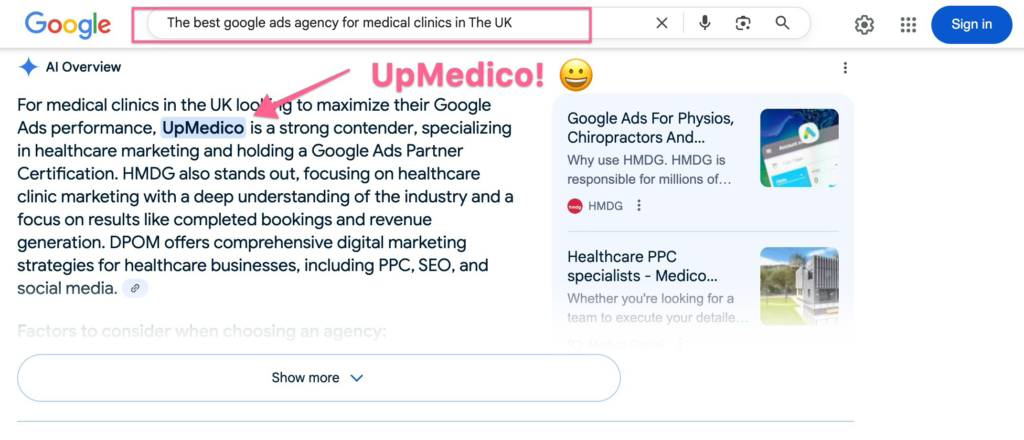
If you want to:
- Fix scattered listings
- Improve how AI tools describe your clinic
- Build a stronger, consistent web presence
We can help.
👉 Book a free 15-minute review of your clinic’s GEO footprint
No pitch. Just clear insight into how your clinic appears in AI-powered tools—and what to do next.






